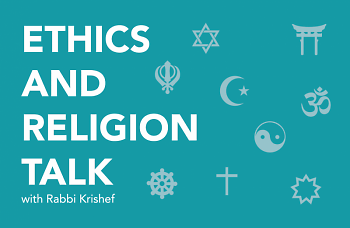Victoria posed a most interesting question due to its ambiguity: “How do you think organized religion has advanced racism in today's society?” It was not clear to me whether she was asking how religion has been a negative force in the world, promoting racism, or how religion has been a force advancing us towards a world with less racism. Both are important questions. First, it is important for religious leaders to look at their traditions and be able to see the flaws. If we have contributed or supported bad behavior, nostra culpa, and we need to identify and take responsibility for the faults in our systems that allowed it to happen. So this week, we’ll address the question, “How has religion been a negative force in the world, promoting racism?” Next week, we’ll examine Victoria’s question from the other perspective and address the question “how has religion advanced us towards a world with less racism?”
Rev. Ray Lanning, a retired minister of the Reformed Presbyterian Church of North America, responds:
Racism is endemic to human life around the globe. Racism is one of the consequences of the fall of the human race from the state of original righteousness into the state of sin and misery (Genesis 3). Since racism has its roots in the corruption of human nature, it is no surprise that racists have sought to exploit religion as a justification and endorsement of their racism. Fallen man corrupts whatever he touches, and the teachings, ordinances, and institutions of the Christian faith are no exception.
In my lifetime, Christians have appealed to the Bible to justify racial segregation and endorse laws and policies of the state that discriminate against racial minorities. Such appeals have fallen out of fashion today, but there is no doubt that our ancient legacy of racism lives on among Christians. My church did not teach me to exalt my race and despise all others, nor did my parents. But growing up in the 1950s and 1960s, I had to confront my own native racism and begin to fight against it. As with many other human failings, the first step to freedom involves acknowledgment that we have for too long been part of the problem, not part of the solution.
Linda Knieriemen, Senior Pastor at First Presbyterian Church in Holland, responds:
Bigotry and white supremacy have been allowed to hide behind religiosity for centuries. The intertwining of Christianity, (both Protestant and Roman Catholic) with colonialism encouraged racist practices in the ‘new world.’
Particularly noteworthy was the complicity of most Christian denominations who condoned slavery because of a erroneous and self-serving interpretations of scripture.
Sunday morning at 11 AM, (a common hour for Christian worship) is still what Rev. Dr. Martin Luther King called the most segregated hour in America.
The Rev. Steven W. Manskar, a retired United Methodist pastor, responds:
The Christian denomination that formed me is The United Methodist Church. For 30 years I have served as a pastor and denominational executive. I am thankful for the church’s emphasis on the pursuit of holiness of heart and life. From its beginning in 18th century England, Methodism opposed slavery and the slave trade. However, to accommodate church growth in the southern states, the church dropped its explicit prohibition of slavery. It fought over the issue from 1784 until 1844 when the church split North and South, setting the stage for the Civil War.
While the northern Methodists opposed slavery they practiced segregation. Black members were forced to sit in the balcony or in the back of the church during worship. They were the last to receive Holy Communion when the sacrament was celebrated.
While official segregation ceased with the Civil Rights movement of the mid twentieth century, The United Methodist Church remains a majority White denomination, with a small number of predominantly Black congregations. Sunday morning continues to be the most segregate time of the week.
Fred Stella, the Pracharak (Outreach Minister) for the West Michigan Hindu Temple, responds:
More than anything, I suspect silence has been the greatest sin. People can be admired for all sorts of virtues in their spiritual community, but bigotry and intolerance seem to be easily forgiven if they are not blatantly expressed.
Hindus have been victims of racism due to the fact that most are of Indian origin. Many are of the same skin tone as African-Americans or Hispanics. That said, it is a sad fact that the sin of colorism is often seen in Indian communities, regardless of religion. Fair complexions seem to be more valued. Skin lightening agents are on display in Indian markets from coast to coast.
This column answers questions of Ethics and Religion by submitting them to a multi-faith panel of spiritual leaders in the Grand Rapids area. We’d love to hear about the ordinary ethical questions that come up in the course of your day as well as any questions of religion that you’ve wondered about. Tell us how you resolved an ethical dilemma and see how members of the Ethics and Religion Talk panel would have handled the same situation. Please send your questions to [email protected].
The Rapidian, a program of the 501(c)3 nonprofit Community Media Center, relies on the community’s support to help cover the cost of training reporters and publishing content.
We need your help.
If each of our readers and content creators who values this community platform help support its creation and maintenance, The Rapidian can continue to educate and facilitate a conversation around issues for years to come.
Please support The Rapidian and make a contribution today.
